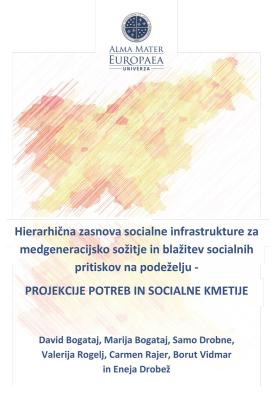Hierarchical design of social infrastructure for intergenerational coexistence and alleviation of social pressures in rural areas - Projections of needs and social farms
Synopsis
Most Slovenian municipalities—excluding Ljubljana and Maribor—are predominantly rural and face growing challenges related to population aging, elderly isolation, and youth migration to urban areas. This new scientific monograph addresses these pressing issues by proposing a modern, intergenerational, and sustainable model of social infrastructure.
Following the guidelines of the World Health Organization (WHO), the monograph emphasizes the importance of:
· Age-friendly built environments (housing, transportation, digital access),
· Efficient service ecosystems (home care, employment policies),
· Inclusive social environments (social participation, communication, information networks).
Key highlights include:
· Demographic projections of aging by region,
· Analysis of long-term care needs and caregiver demand,
· Survey results revealing the preferences and financial capacities of older adults,
· Concepts for developing smart silver villages and integrating social farms as supplementary on-farm activities.
The publication also explores opportunities for new employment that would encourage younger generations to remain in rural areas, thereby contributing to the revitalization of the Slovenian countryside.
The monograph raises critical questions about the future of elder care in Slovenia and offers concrete strategies for building a more inclusive and sustainable long-term care system—centered on intergenerational harmony and rural development.
This monograph is intended for municipalities, policymakers, researchers, and all stakeholders involved in rural development and long-term care systems.
Downloads


